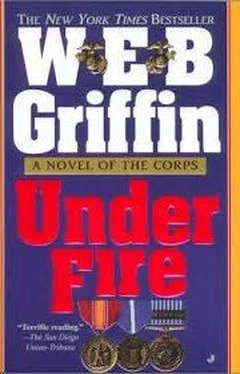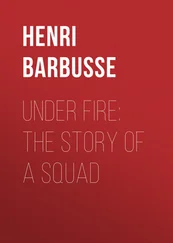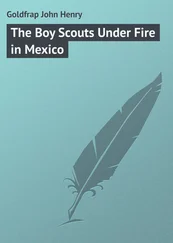Griffin W.E.B. - The Corps 09 - Under Fire
Здесь есть возможность читать онлайн «Griffin W.E.B. - The Corps 09 - Under Fire» весь текст электронной книги совершенно бесплатно (целиком полную версию без сокращений). В некоторых случаях можно слушать аудио, скачать через торрент в формате fb2 и присутствует краткое содержание. Год выпуска: 0101, Жанр: Старинная литература, на английском языке. Описание произведения, (предисловие) а так же отзывы посетителей доступны на портале библиотеки ЛибКат.
- Название:The Corps 09 - Under Fire
- Автор:
- Жанр:
- Год:0101
- ISBN:нет данных
- Рейтинг книги:5 / 5. Голосов: 1
-
Избранное:Добавить в избранное
- Отзывы:
-
Ваша оценка:
- 100
- 1
- 2
- 3
- 4
- 5
The Corps 09 - Under Fire: краткое содержание, описание и аннотация
Предлагаем к чтению аннотацию, описание, краткое содержание или предисловие (зависит от того, что написал сам автор книги «The Corps 09 - Under Fire»). Если вы не нашли необходимую информацию о книге — напишите в комментариях, мы постараемся отыскать её.
The Corps 09 - Under Fire — читать онлайн бесплатно полную книгу (весь текст) целиком
Ниже представлен текст книги, разбитый по страницам. Система сохранения места последней прочитанной страницы, позволяет с удобством читать онлайн бесплатно книгу «The Corps 09 - Under Fire», без необходимости каждый раз заново искать на чём Вы остановились. Поставьте закладку, и сможете в любой момент перейти на страницу, на которой закончили чтение.
Интервал:
Закладка:
What is he doing? Ever so subtly suggesting that I don't put this invade-behind-their-lines idea of his in my report to the President?
Of course, he is.
"And on the West Coast, working northward," MacArthur went on, using the pointer, "we have Yangdok, Kangwung, and ultimately Wonsan."
Wonsan is in North Korea!
"Wonsan-although it would be tactically ideal to cut the peninsula-is out of the question at this time, as I am under orders to push the enemy out of South Korea, not invade his homeland."
Is he reading my mind?
Both the Russians and the Chinese would take an Amer-ican invasion of North Korea as an excuse to intervene in this war. Doesn't he know that?
Slow down, Pickering.
This is Douglas MacArthur talking, if not the greatest military mind of our era, then right at the top of that list.
He not only knows as much about amphibious invasions as anyone else, probably more than anyone else, but is also probably as astute a judge of Soviet and Chinese intentions as anyone in the government.
Because we misjudged Russian ambitions, a quarter of Germany is a Russian zone from which we are barred, and Berlin and Vienna are similarly divided. We had to have the Berlin Airlift to keep the Russians from forcing us out.
Because MacArthur knew what they were up to, he stood up to them.
There are no Russians in Japan, period.
"You seem lost in thought, Fleming," MacArthur said, smiling.
"This is a lot to take in at once," Pickering said.
"What we have to do is to strike decisively," MacArthur said. "Not to have to fight our way inch by inch back up the peninsula. The question is where to do so. At the least pos-sible cost in American lives. As we're already learning, the loss of life is not a high priority for the other side."
That's another good side of him. He does try to keep losses at a minimum. I saw that time and time again in World War II.
"A moment ago, I might have seemed to be suggesting that you not get into the details of my initial thinking when you report to the President," MacArthur said. "I was."
Pickering looked at him but didn't reply.
"My thinking there, Fleming, is that there is certainly go-ing to be a hunger in Washington for any action that will turn the situation around. From my standpoint, it would be better if one of my ideas were not seized upon-or the flip side of the coin, strongly objected to-until I can firm up what I think we should do, and then present a plan to the President for his approval. Or disapproval. I am not asking you to do anything that would, in any way, violate your duty to report to the President anything you believe he should hear."
You're doing exactly that, of course. I was sent here to be a reporter, not a judge. But you're right-as usual. There will be a frenzy in Washington to do something, and there is a good chance they would hop on one idea that ul-timately wouldn't work, or reject another one that would.
I can give him that much.
"I will report to the President that you have several plans under study," Pickering said, "and that I will furnish fur-ther details as they become available."
"If you think that's what you should do," MacArthur said. "One further question: Can you tell me about General Howe?"
"I've only met with him briefly. Apparently, he and the President became friends after World War One, in the Na-tional Guard." Pickering paused and went off at a tangent. "Did you know the President is a retired National Guard colonel?"
"No. But I did know he served with distinction in France, as a captain of artillery."
"Well, sir, it appears Howe rose to major general, and commanded a division in Europe. He enjoys the Presi-dent's confidence. From what I've seen of him, he's a good man."
"As you and I have both learned," MacArthur said with a smile, "it can be very useful for a field commander to have direct access to the commander-in-chief via a good man."
There comes the soft soap.
"Jeanne insists on having you for lunch," MacArthur went on. "If I sent a car for you at one, would that give you enough time to get settled?"
"Yes, thank you very much," Pickering said.
He was halfway down the corridor to General Almond's office before it occurred to him that (a) he had been dis-missed; (b) the reason he had been dismissed was that El Supremo had something important to do; (c) which was most likely a conference about either the war at the mo-ment, or his plans for the war in the future; and (d) that not only did he have every right to attend such a conference, but that's what he was supposed to be doing.
You got me that time, and good, Douglas MacArthur, but that will be the last time.
Chapter Eight
[ONE]
HEADQUARTERS
EIGHTH UNITED STATES ARMY
TAEGU, KOREA
0530 15 JULY 1950
Captain Kenneth R. McCoy, who was wearing obviously brand-new USMC utilities and 782 gear, and had an M-l Garand rifle slung over his shoulder, saluted the U.S. Army transportation corps major in charge of the Headquarters, Eighth Army motor pool, and said, "Good morning, sir."
The major was a portly man in his mid-thirties, armed with a.45 ACP pistol. His fatigue jacket was sweat-stained under his armpits, and there were beads of sweat on his forehead. His eyes showed lack of sleep, and he needed a shave.
He returned McCoy's salute with a bored gesture.
"Yes?" he asked, impatiently.
"Sir, I'm going to need a Jeep, and a trailer and some gas in jerry cans."
"Out of the fucking question, Captain," the major said. Then he took a closer look at McCoy's utilities. "Marine? I didn't know the Marines were here."
"So far, there's just two of us, sir," McCoy said, and handed the major what he thought of as "the Dai-Ichi or-ders"; they had come from SCAP headquarters in the Dai Ichi Building. "But we are going to need some wheels."
The major took the orders and read them.
SUPREME HEADQUARTERS
Allied Powers
Tokyo, Japan
14 July 1950
SUBJECT: Letter Orders
TO: MCCOY, K. R. Captain USMC
ZIMMERMAN, E.W. Master Gunner USMC
In connection with your mission, you are authorized and directed to proceed to such places in Japan and Korea at such times as may be nec-essary.
All U.S. Army, Air Force and Navy organizations under SCAP are di-rected to provide you with such lo-gistical support as you may require. Priority AAAAA is assigned for travel.
FOR THE SUPREME COMMANDER:
Edward M. Almond
EDWARD M. ALMOND
Major General, USA
Chief of Staff
EMA/ah
"So?" the major asked.
"Sir, the logistical support I need is a Jeep, trailer, and some gas in cans."
"Captain," the major said, "I don't give a good goddamn if you have orders signed by the Pesident himself, I don't have Jeeps for bird colonels, so there's none for a captain. Now do us both a favor and get the fuck out of here!"
McCoy saluted-it was not returned-and did an about-face movement and marched out from under the canvas fly that presumably was intended to shield the motor pool offi-cer's portable field desk from sun and rain.
Although General Pickering had told Captain McCoy that Eighth Army Headquarters had been "set up" in Taegu, when he and Zimmerman had arrived there after midnight-via the K-l airfield at Pusan, and hitching a ride on a truck the rest of the way-it was immediately clear that "set up" was an intention rather than a fait ac-compli.
They had spent the night uncomfortably-it was hot, and muggy, and there were hordes of mosquitoes, flies, and other insects-in their clothing on mattressless folding canvas cots in a twelve-man squad tent. When they rose at first light, they saw the tent was one of a dozen that had been set up in what looked like the playground of a school building before which had been erected a plywood sign identifying it as Headquarters EUSAK.
Читать дальшеИнтервал:
Закладка:
Похожие книги на «The Corps 09 - Under Fire»
Представляем Вашему вниманию похожие книги на «The Corps 09 - Under Fire» списком для выбора. Мы отобрали схожую по названию и смыслу литературу в надежде предоставить читателям больше вариантов отыскать новые, интересные, ещё непрочитанные произведения.
Обсуждение, отзывы о книге «The Corps 09 - Under Fire» и просто собственные мнения читателей. Оставьте ваши комментарии, напишите, что Вы думаете о произведении, его смысле или главных героях. Укажите что конкретно понравилось, а что нет, и почему Вы так считаете.










